Outsourcing Legal Intake vs. AI Voice Agents: Which Saves More Time for Your Firm?
This in-depth comparison reveals that while both outsourcing and AI voice agents save time over traditional intake processes, Legal Clerk AI delivers dramatically superior efficiency. The numbers tell the story: AI reduces implementation time by 50%, processes intakes 3x faster, and slashes management overhead by 75-80% compared to outsourcing. For small firms, it eliminates minimum volume requirements, while larger firms benefit from standardized intake across multiple practice areas. Real-world implementation shows firms can reclaim over 1,500 attorney hours annually, transforming intake from a burden into a strategic advantage in today's competitive legal market.
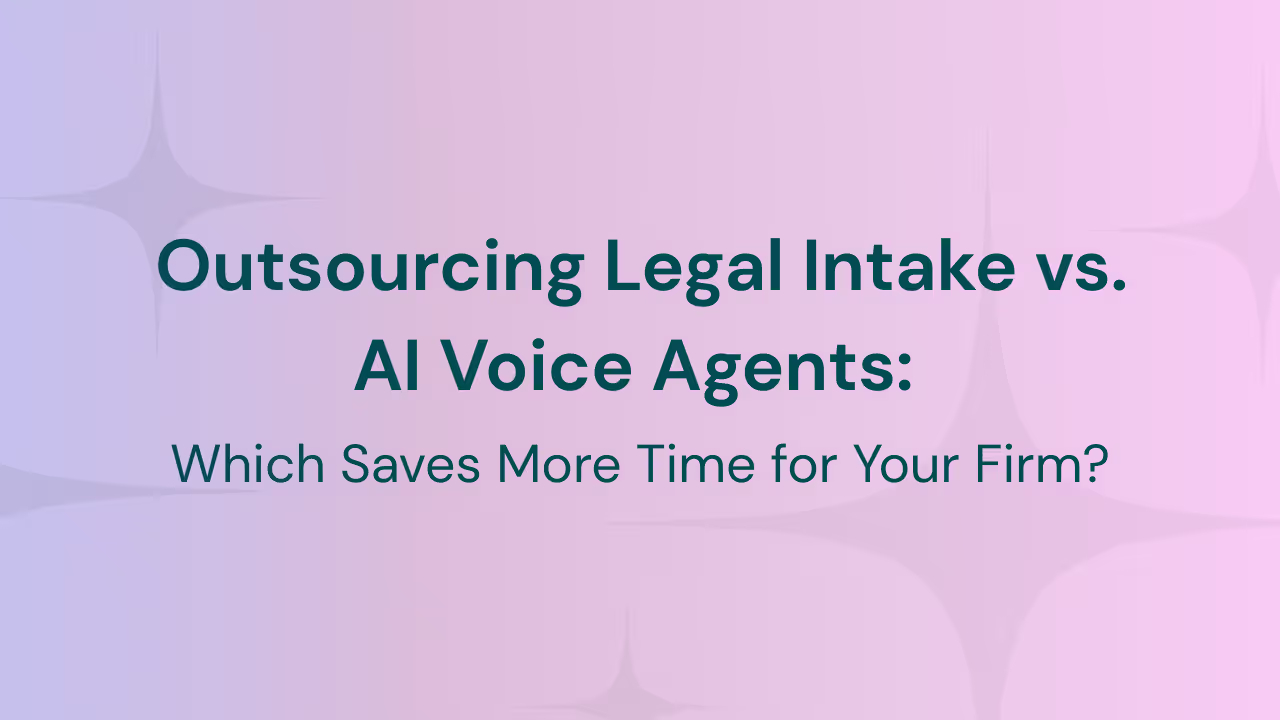
The average attorney spends over 6 hours weekly on intake-related activities that generate zero billable hours. As competition grows fiercer in the legal industry, law firms face mounting pressure to maximize attorney time while still delivering exceptional client experiences. Traditional intake processes eat up valuable hours that could be spent on billable work or business development.
This article examines two leading approaches to reclaiming attorney time: outsourcing intake to specialized service providers versus implementing AI voice agents like Legal Clerk AI. We'll analyze the time-saving potential of each approach and provide a framework for determining which solution best fits your firm's unique needs. Finding the right time-efficient legal intake solutions can dramatically impact your bottom line in today's competitive legal landscape where legal intake time savings AI voice agents vs outsourcing decisions matter more than ever.
The Hidden Time Costs of Traditional Legal Intake
Before examining alternative solutions, firms must understand how traditional intake drains productivity and impacts their bottom line.
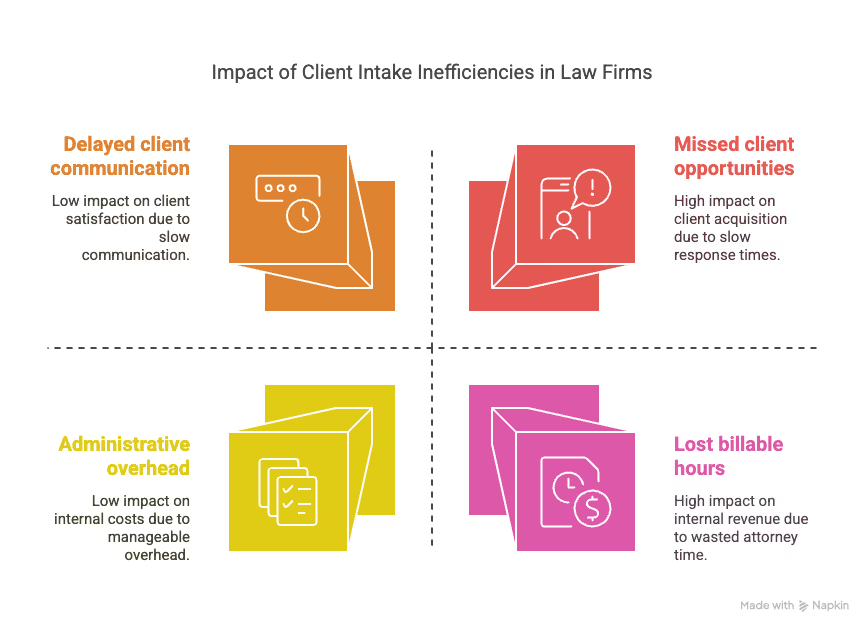
The Attorney Time Drain
Research shows that attorneys at firms with traditional intake processes spend 6-10 hours weekly on intake-related activities. This represents $15,000-25,000 in lost billable time per attorney annually. These activities include initial consultations, qualification screening, conflict checks, and explaining fee structures—tasks that rarely generate revenue but consume valuable attorney time.
The problem is widespread across the profession. According to Clio's 2024 Legal Trends Report, 79% of legal professionals now use AI in their practice, with many specifically targeting intake inefficiencies. This rapid adoption reflects the growing recognition of just how much attorney time is being wasted on administrative tasks that could be handled through other means.
The Administrative Burden
Beyond attorney time, traditional intake creates significant administrative overhead. Staff members spend 12-15 hours weekly per 100 matters on data entry, document preparation, and coordination between departments.
This burden comes with real costs. The average salary for a legal receptionist in 2025 is $43,685, which doesn't include benefits, training, or turnover costs. As firms grow, these time costs increase linearly, creating scaling challenges and operational inefficiencies that can quickly spiral out of control.
The Client Experience Impact
Inefficient intake processes extend beyond internal time costs to affect client acquisition and satisfaction. Studies indicate that 42% of potential clients expect a response within 3 hours of their inquiry. However, the average law firm takes 12+ hours to respond to new inquiries.
This responsiveness gap directly impacts conversion rates. Research from Big Voodoo reveals that only 52% of salespeople make the effort to follow up with potential clients at all. This statistic reflects the reality in many law firms, where traditional intake processes struggle with timely client communication, resulting in missed opportunities and frustrated potential clients.
Outsourcing Legal Intake: Trading Control for Time Savings
Many firms have turned to specialized service providers to handle intake processes, creating immediate time savings but with important trade-offs.
Key Features of Outsourced Legal Intake
External service providers handle phone answering, initial screening, conflict checking, and appointment scheduling according to firm-specific protocols. These providers typically employ trained legal intake specialists who understand basic legal terminology and intake requirements.
Outsourcing works best for firms seeking immediate staff relief without technology investment or those with fluctuating intake volumes that make staffing unpredictable. The main selling point is simplicity – you can implement outsourced intake in weeks without changing your existing systems.
However, outsourcing creates new management requirements, potential quality control issues, and ongoing communication challenges that can offset some time savings. You're essentially trading direct control for convenience, which works well for some firms but creates new headaches for others.
Quantifiable Time Savings with Outsourcing
Law firms implementing outsourced intake solutions report reclaiming 70-80% of attorney time previously dedicated to intake activities. Administrative staff typically regain 50-60% of intake-related hours, which can be redirected to other operational priorities.
Time savings break down as follows:
- Attorney time savings: 4-8 hours weekly per attorney
- Administrative time savings: 6-9 hours weekly per 100 matters
- Management oversight required: 2-4 hours weekly (new requirement)
The net time impact is positive but requires ongoing management attention to maintain quality and efficiency gains. Firms must factor in this management overhead when calculating the true time-saving value of outsourcing.
Hidden Time Costs of Outsourcing
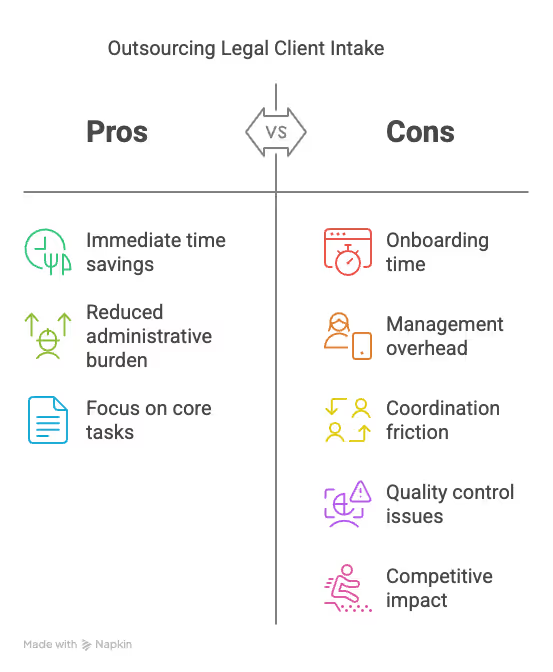
While outsourcing creates immediate time savings, firms must consider several factors that may offset these gains.
Initial onboarding and training requires 20-30 hours of firm time to document processes, establish protocols, and train outsourced staff. This upfront investment can delay the realization of time savings by several weeks.
Partners or senior staff typically spend 2-4 hours weekly managing the outsourced relationship, reviewing performance, and addressing quality issues. This management burden often falls on already-busy partners, creating a new time requirement that wasn't necessary with in-house staff.
Information transfer between outsourced providers and firm staff creates new friction points, adding 1-2 hours weekly in coordination time. Quality control becomes another hidden time cost, with firms reporting they spend 3-5 hours weekly addressing intake errors or incomplete information gathering by outsourced teams.
With 1.3 million lawyers in the U.S. competing for client attention, these small inefficiencies can significantly impact a firm's competitive position. Law firms seeking powerful law firm productivity tools need to carefully weigh these hidden costs against the apparent time savings.
AI Voice Agents: The Legal Clerk AI Advantage
AI voice agents represent the cutting edge of legal intake automation, offering unprecedented time savings while maintaining quality control.
Key Features of Legal Clerk AI
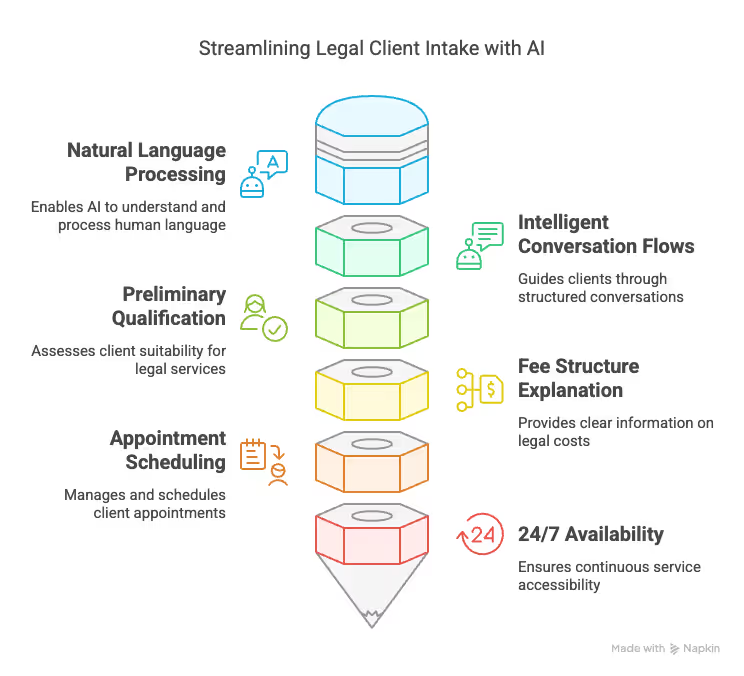
Legal Clerk AI for law firms uses advanced natural language processing to conduct initial client conversations across multiple channels (phone, web, messaging). The system gathers required information through intelligent conversation flows, performs preliminary qualification, explains fee structures, and schedules appointments directly in the firm's calendar system.
This technology works best for forward-thinking firms seeking maximum time efficiency, standardized intake processes, and 24/7 availability without proportional cost increases. According to Law Next, 30% of law firms adopted AI in 2024 (up from 11% in 2023), with intake automation being one of the primary use cases.
The adoption rate is even higher among smaller practices, with 53% of small law firms now using generative AI according to Smokeball's 2025 State of Law report. This rapid growth reflects the significant advantages AI offers for streamlining intake processes and helping reduce attorney administrative time.
Quantifiable Time Savings with Legal Clerk AI
Firms implementing Legal Clerk AI report the highest level of time reclamation among available solutions. Attorneys reclaim 90-95% of time previously spent on intake activities, while administrative staff see 80-85% reductions in intake processing time.
Time savings break down as follows:
- Attorney time savings: 5-9.5 hours weekly per attorney
- Administrative time savings: 10-13 hours weekly per 100 matters
- System management required: 0.5-1 hour weekly (primarily reviewing exceptions)
We Pick Up The Phone reports that firms using AI voice agents see a 40% reduction in non-billable tasks, freeing attorneys to focus on high-value work that directly generates revenue.
The net time impact is significantly positive with minimal ongoing management requirements. Unlike outsourcing, which requires constant oversight, AI systems require only occasional monitoring and adjustment.
The Legal Clerk AI Difference
Unlike outsourced solutions that merely shift work outside the firm, Legal Clerk AI fundamentally transforms the intake process through intelligent automation. The system continuously learns from interactions, improving its efficiency and accuracy over time without requiring additional training or management attention.
This difference is significant for firms looking to automate legal client intake completely rather than just relocating the work. According to Salesforce data, 95% of firms using AI report cost and time savings, with intake automation providing some of the most dramatic efficiency improvements.
Client satisfaction also improves with AI voice agents. Verloop reports that 89% of clients prefer AI voice-enabled support due to its immediate availability and consistent experience. Rather than feeling impersonal, many clients appreciate the efficient, 24/7 responsiveness that AI voice agents provide.
Outsourcing vs. Legal Clerk AI: Time Efficiency Metrics
Direct comparison of time metrics helps firms understand the full efficiency impact of each approach across different aspects of the intake process.
Initial Implementation Time Investment
Outsourcing typically requires 3-4 weeks for vendor selection, process documentation, and training. Firms usually invest 20-30 hours in startup activities before seeing any benefits. The process involves multiple meetings, documentation of protocols, and training sessions.
In contrast, Legal Clerk AI initial configuration takes just 2-3 weeks with only 10-15 hours of firm time for workflow review and system customization. Most of the setup work is handled by the Legal Clerk AI team.
This creates a clear time advantage: Legal Clerk AI reduces implementation time by 50% compared to outsourcing alternatives. Firms can start reclaiming attorney and staff time twice as quickly, with half the upfront time investment.
Intake Processing Efficiency
Outsourced intake solutions average 15-25 minutes per matter for complete intake processing. This timing can vary widely based on matter complexity and can stretch even longer during high-volume periods when outsourced teams are handling multiple clients simultaneously.
Legal Clerk AI maintains consistent 5-8 minute intake completion regardless of volume or complexity. The system can also process multiple inquiries simultaneously without degradation in performance or speed, unlike human operators who can only handle one call at a time.
The time advantage is significant: Legal Clerk AI processes intakes 3x faster than outsourced alternatives, with no capacity limitations during peak periods. This consistent processing speed helps firms maintain quick response times even during busy periods.
After-Hours Response Time
Outsourced intake services are typically limited to business hours or subject to premium charges for extended coverage. Many firms find that after-hours coverage is prohibitively expensive, creating a responsiveness gap when potential clients reach out in the evening or on weekends.
Legal Clerk AI offers 24/7 instant response with no additional costs or capacity limitations. The system provides the same high-quality intake experience at 2 AM on Sunday as it does at 10 AM on Monday, ensuring no potential client is ever left waiting for a response.
This creates perhaps the most significant time advantage: Legal Clerk AI eliminates the 12+ hour response gap that occurs with most outsourced solutions for after-hours inquiries. For time-efficient legal intake solutions, nothing matches the consistent availability of AI voice agents.
Management Overhead Comparison
Outsourcing requires 2-4 hours weekly for quality control, performance reviews, and issue resolution. This management burden typically falls on senior staff or partners, taking time away from their core responsibilities and billable work.
Legal Clerk AI requires just 0.5-1.0 hour weekly for system monitoring and exception handling. The system handles the vast majority of intakes without human intervention, flagging only unusual cases for review.
The time advantage is clear: Legal Clerk AI reduces management overhead by 75-80% compared to outsourced alternatives. This dramatic reduction in oversight requirements represents one of the most significant but often overlooked benefits of AI-based intake systems.
Comprehensive Time Savings Table
Law Firm Size Impact: Finding Your Perfect Time-Saving Solution
The optimal approach varies based on firm size and structure - this section provides tailored guidance for different practice scales.
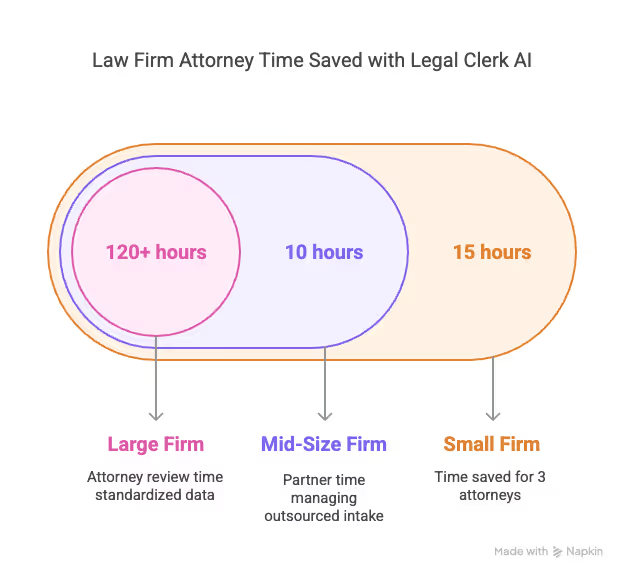
Solo Practitioners & Small Firms (1-5 Attorneys)
Small firms face unique time management challenges, with attorneys often handling intake directly due to limited staff resources. For these firms, every minute spent on administrative tasks directly impacts revenue potential.
Outsourcing presents a significant challenge for small practices. Most outsourcing solutions have minimum volume requirements or retainer costs that may not be economical for very small firms. Solo practitioners often find they're paying for capacity they don't use.
Legal Clerk AI for law firms creates enterprise-level intake capabilities without minimum volume requirements. The technology allows solo practitioners to maintain 24/7 availability and standardized intake without hiring staff or managing outsourced relationships.
A 3-attorney family law practice implementing Legal Clerk AI reclaimed 15 hours weekly of attorney time previously spent on phone consultations and intake processing. This represented a 30% increase in available billable hours - equivalent to adding almost half an attorney to the practice without increasing headcount costs.
Mid-Size Firms (6-30 Attorneys)
Mid-size firms typically maintain dedicated intake staff but struggle with volume fluctuations and scaling costs. These firms often see dramatic swings in intake volume based on marketing campaigns, seasonal factors, or practice area trends.
Outsourcing works well for baseline volumes but becomes costly during growth phases or seasonal spikes. Many outsourced providers charge premium rates for volume increases, creating budget uncertainties.
Legal Clerk AI offers mid-size firms the ability to handle volume fluctuations without additional costs or quality degradation. The time savings extend beyond intake to include reduced supervision requirements and eliminated training needs.
A 22-attorney regional firm that shifted from outsourced intake to Legal Clerk AI eliminated 10 hours weekly of partner time previously spent managing the outsourced relationship. The firm also improved conversion rates by 35% due to faster response times.
Large Firms (30+ Attorneys)
Large firms with established intake departments face significant time management challenges across multiple practice areas and office locations. Maintaining consistent intake quality across different specialties creates substantial oversight requirements.
Complex firms often require multiple outsourcing relationships to handle specialized practice areas, creating substantial management overhead. Each relationship requires separate oversight, billing, and quality control processes.
For large, multi-practice firms, Legal Clerk AI provides consistent intake processes across all locations and specialties while eliminating the time cost of managing multiple outsourced relationships. The system handles practice-specific requirements without additional configuration time.
An AmLaw 200 firm implementing Legal Clerk AI across eight practice areas eliminated 120+ hours monthly of attorney review time while standardizing data collection. The firm reported that the law firm productivity tools provided by the AI system created unprecedented visibility into intake metrics.
Case Study: Regional Firm Transforms Intake Efficiency
Real-world implementation demonstrates the measurable time-saving impact of AI voice agents compared to previous outsourced solutions.
A 15-attorney regional firm with four practice areas struggled with inconsistent intake quality between outsourced services (used during business hours) and attorney-handled intake (after hours). Attorneys spent an average of 8 hours weekly managing intake processes, while staff devoted 20+ hours weekly to reconciling information between systems.
The firm implemented Legal Clerk AI with practice-specific conversation flows, integrated with their practice management and billing systems. Implementation took just under four weeks, with about 12 hours configuring the system to match their specific requirements.
The time-saving results were dramatic:
- Attorney time on intake reduced by 90% (from 8 hours to 45 minutes weekly)
- Administrative time reduced by 85% (from 20+ hours to 3 hours weekly)
- Management time for outsourced relationship eliminated (saving 3 hours weekly)
- Client response time improved from 4+ hours to instant for 100% of inquiries
- Consultation booking time reduced from 48 hours to same-day for 80% of matters
In total, the firm reclaimed over 1,500 attorney hours and 1,000 administrative hours annually - equivalent to adding a full-time associate without increasing headcount.
Implementation Timeline: How Quickly Can You Save Time?
Understanding the timeline to achieving real time savings helps firms plan their transition to more efficient intake solutions. Let's compare how quickly each approach delivers results.
Outsourcing Implementation Timeline
Moving to an outsourced intake solution typically follows this timeline:
Week 1-2: Vendor selection and contract negotiation Week 3-4: Process documentation and protocol development Week 5-6: Initial training and test calls Week 7-8: Rollout and quality adjustment period
The total time to value is 8+ weeks before firms see substantial time savings realized. During this period, firms must maintain their existing intake processes while simultaneously developing the new outsourced system.
Legal Clerk AI Implementation Timeline
Implementing AI voice agents follows a much more streamlined timeline:
Week 1: System configuration and workflow mapping Week 2: Integration with existing practice management systems Week 3: Testing and refinement Week 4: Full deployment with immediate time savings
The total time to value is just 4 weeks before full time savings are realized. This expedited timeline means firms start reclaiming attorney and staff time twice as quickly as with outsourced alternatives.
Legal Clerk AI delivers time savings twice as quickly as outsourced alternatives, with significantly less firm time required during the setup process. This rapid implementation helps firms reduce attorney administrative time faster, creating immediate efficiency gains.
Conclusion: Making the Time-Efficient Choice for Your Firm
When evaluating legal intake options, the data speaks for itself. While both approaches save time compared to traditional in-house methods, Legal Clerk AI delivers superior efficiency across all key metrics. The AI solution cuts implementation time by 50%, processes intakes 3x faster, eliminates after-hours gaps, and slashes management overhead by 75-80% compared to outsourcing.
For law firms seeking the ultimate time-efficient legal intake solutions, AI voice agents clearly outperform outsourced alternatives in 2025. The technology transforms intake from an administrative burden into a streamlined process that enhances client experience while freeing attorneys to focus on billable work.
Legal intake time savings AI voice agents vs outsourcing isn't just an operational decision – it's a strategic advantage in today's competitive legal market. By implementing Legal Clerk AI for law firms, you can reduce attorney administrative time dramatically while improving client conversion rates.
Ready to see the difference intelligent automation can make? Book your free demo today and discover how Legal Clerk AI can save your firm hundreds of attorney hours annually with a personalized time-saving analysis.
FAQs About Time Efficiency in Legal Intake
Firms considering new intake solutions often have questions about how these systems will work in their specific environments. Here are answers to the most common questions about time efficiency in modern legal intake.
Q: How does Legal Clerk AI handle complex matter types?
Legal Clerk AI can be configured with specialized conversation flows for different practice areas and matter complexities. The system identifies matter type early in the conversation and follows appropriate protocols, efficiently gathering relevant information while flagging complex cases for attorney review when necessary.
This intelligent routing ensures time is only spent by attorneys on truly complex matters, not routine intake tasks.
Q: Does implementing AI mean our clients lose the personal touch?
Legal Clerk AI maintains the personal element through natural conversation while eliminating impersonal aspects of traditional intake like repetitive form-filling and basic screening questions.
Attorneys report more meaningful initial consultations because basic information is already gathered, allowing them to focus on the client's specific legal needs rather than administrative details. This actually improves the client experience while saving attorney time.
Q: How does Legal Clerk AI compare to our existing online intake forms?
While online forms shift work to the client, Legal Clerk AI handles the work for them through conversation. This results in 3x higher completion rates and 65% more complete information gathering compared to self-service forms.
The AI approach saves both client and attorney time by eliminating the back-and-forth typically required to complete intake forms. Information is gathered conversationally, making the process faster and more pleasant for potential clients.
Q: Can Legal Clerk AI integrate with our current technology systems?
Yes. Legal Clerk AI offers pre-built integrations with major legal practice management platforms, CRMs, and calendaring systems. Custom API connections can be established for specialized systems, typically requiring less than two weeks of configuration time.
This seamless integration eliminates the need for manual data transfer between systems, saving administrative time and reducing error rates.
Q: What happens if Legal Clerk AI encounters a situation it can't handle?
The system includes intelligent escalation protocols that route complex cases or unusual situations to appropriate human staff based on customizable criteria. Even in these scenarios, the AI gathers preliminary information, saving time for the human who ultimately handles the exception.
These exception handling features ensure that all intake scenarios are handled appropriately, while still maximizing time savings across the entire intake process.
Recent Blogs
FAQs: Everything You’re Wondering About Your AI Receptionist
Absolutely. Whether you need a full-time law firm answering service or just support during off-hours, LegalClerk adjusts to your needs. You control when the AI receptionist picks up.
Yes. LegalClerk is built specifically for law firms. It knows how to handle legal intake questions, understands terminology by practice area, and never misses a required field or form detail.
Yes. Our AI legal receptionist uses advanced natural language processing and human-like voice tech to deliver a warm, responsive client experience. Most callers can’t tell it is AI — and that’s by design.
Yes. LegalClerk connects with tools like Clio, Lawmatics, Google Calendar, Calendly, and more. New leads, appointments, and intake summaries are automatically synced.
Yes. LegalClerk offers multilingual legal receptionist support, allowing you to serve a broader range of clients with accurate, translated intake flows.
Completely. LegalClerk uses HIPAA-grade encryption, secure storage, and detailed access logging. Every call and submission is protected and fully auditable.

.avif)
3.jpg)

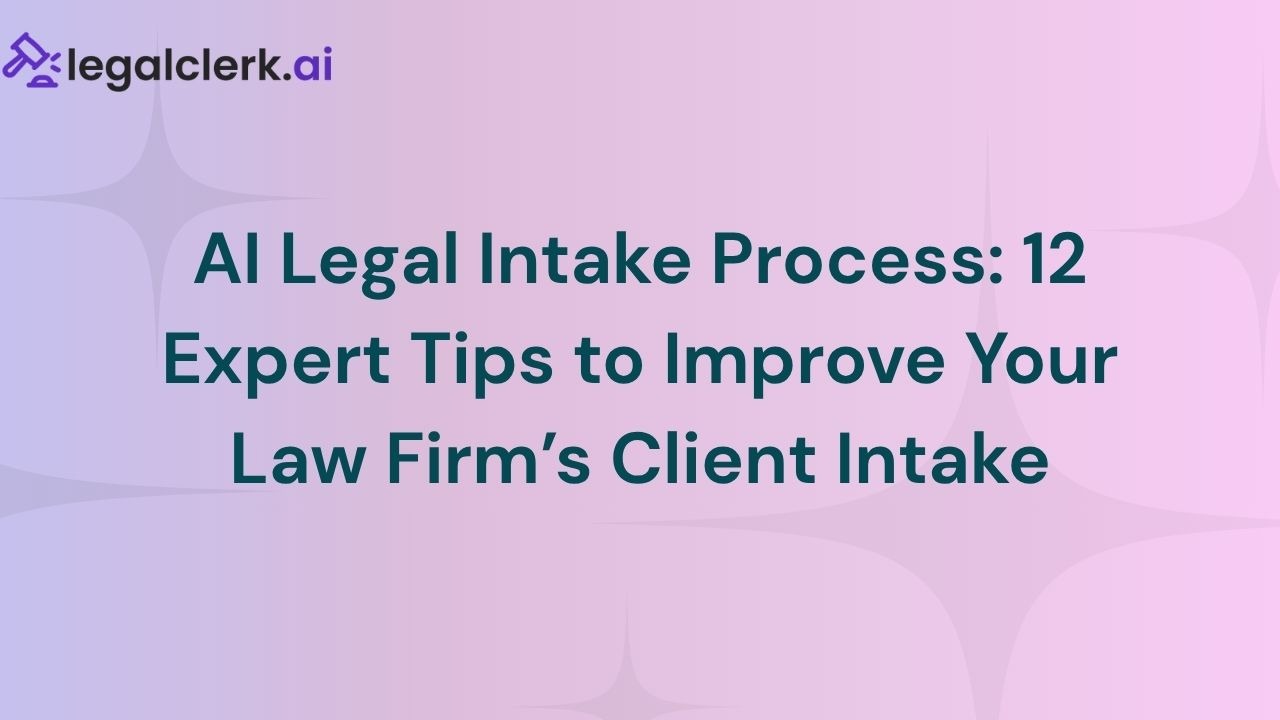
.jpg)